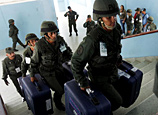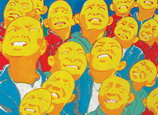
BEIJING, April 12 (Xinhua) -- For 10 years, Jing Deshen and his wife kept silent about their brush with SARS.
The very name of the disease was taboo in the family and little is known about what the couple went through in isolation in their Beijing hospital ward.
Having survived the deadly pandemic in 2003, Jing retreated from all social life. He is afraid of the color white due to his time in the hospital and prefers to stay at home listening to the radio and watching TV, hoping the sound can dispel the haunting memories from his mind.
But with China marking the 10th anniversary of its war on Severe Acute Respiratory Syndrome (SARS), the 57-year-old Beijing resident has decided to break his silence.
"I want to remind the public never to forget the lessons learned from SARS," Jing said.
Jing is among some 2,280 people in Beijing who survived the deadly respiratory disease 10 years ago.
In 2003, the pandemic infected over 5,000 people on the Chinese mainland, half of whom were in Beijing. A total of 348 people died.
Many of the survivors are now disabled by bone necrosis and pulmonary fibrosis resulting from the infection, as well as the hormone therapy that proved to be the only effective cure at the time.
Their past decade has been marked by pain, hardship and solitude. Many are steeped in depression.
Jing and his wife were infected by SARS after visiting a hospital in Beijing to treat Jing's relapsing bronchitis on April 12, 2003, not knowing the hospital had been contaminated by SARS.
Though rumors about a "weird disease" originating in the southern province of Guangdong had gone around Beijing, the city government had denied the occurrence of a large-scale breakout.
"In retrospect, I believe the hospital was responsible -- I was told to stay in a ward for suspected SARS patients without any protection or warning," Jing said. "The doctors insisted I should call up a family member to keep me company. That was how my wife became infected, too."
At the onset of the SARS outbreak, hospitals in Beijing had neither the experience nor adequate quarantine facilities necessary for handling such a crisis, which led to a massive number of infections among patients and medical workers.
The turning point was April 20, when former Health Minister Zhang Wenkang and Beijing mayor Meng Xuenong were removed from their posts. At the same time, Beijing began publishing daily reports on the epidemic and beefed up medical efforts, including building more isolated wards for SARS patients.
 |
















 WWII TV dramas border on the ridiculous
WWII TV dramas border on the ridiculous


![]()
